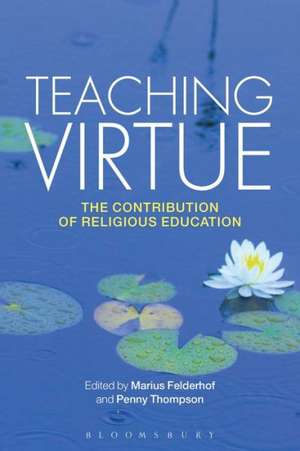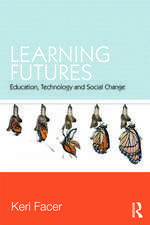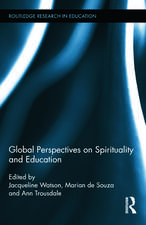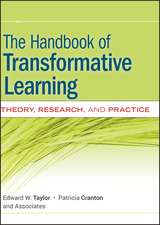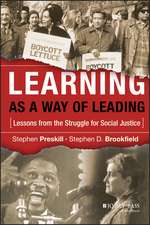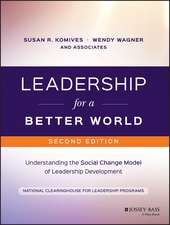Teaching Virtue: The Contribution of Religious Education
Editat de Marius Felderhof, Penny Thompsonen Limba Engleză Hardback – 19 noi 2014
Preț: 832.65 lei
Preț vechi: 1066.04 lei
-22% Nou
Puncte Express: 1249
Preț estimativ în valută:
159.32€ • 166.80$ • 131.83£
159.32€ • 166.80$ • 131.83£
Carte tipărită la comandă
Livrare economică 05-19 aprilie
Preluare comenzi: 021 569.72.76
Specificații
ISBN-13: 9781472522917
ISBN-10: 1472522915
Pagini: 248
Dimensiuni: 156 x 234 x 18 mm
Greutate: 0.54 kg
Editura: Bloomsbury Publishing
Colecția Bloomsbury Academic
Locul publicării:London, United Kingdom
ISBN-10: 1472522915
Pagini: 248
Dimensiuni: 156 x 234 x 18 mm
Greutate: 0.54 kg
Editura: Bloomsbury Publishing
Colecția Bloomsbury Academic
Locul publicării:London, United Kingdom
Caracteristici
Takes an ethical focus, arguing for a closer link between virtue ethics and religious education
Notă biografică
Marius Felderhof is Honorary Senior Research Fellow in the Department of Theology and Religion at the University of Birmingham, UK.Penny Thompson is a freelance writer and researcher in religious education, based in the UK.
Cuprins
Foreword Bhai Sahib Bhai Mohinder SinghAcknowledgementsNotes on ContributorsIntroduction M.C. Felderhof (University of Birmingham, UK) and P.A. Thompson (Freelance Researcher and Writer, UK)Part I: Orientations1. The Prospective Nature of Religious Education M.C. Felderhof (University of Birmingham, UK)2. The Need for Responsible Religious Education in a 'Value Free' Society Brenda Watson (Freelance Educationalist and Writer, UK)3. Virtue Ethics: Background and Current Popularity David Carr (University of Edinburgh, UK)4. The Demise and Rebirth of Moral Education in English Religious Education L. Philip Barnes (King's College London, UK)Part II: Dispositions5. Being Honest (Foundational) Brenda Watson (Freelance Educationalist and Writer, UK)6. Being Compassionate (Looking to Others) Rod Garner (Diocese of Liverpool, UK)7. Being Just (Relationships with Others) William K. Kay (Glyndwr University, UK)8. Being Courageous (Required by the Pursuit of Justice) Ieuan Lloyd (University of Birmingham, UK)9. Being Hopeful (Looking to Positive Outcomes of Actions) Penny Thompson (freelance writer and researcher, UK)10. Being Temperate (Moderating Actions) M.C. Felderhof (University of Birmingham, UK)11. Being Wise (Achieving a Balance) Joe Houston (University of Glasgow, UK)12. Being Faithful (Being True to One's Calling) Jeff Astley (North of England Institute for Christian Education, UK)Part III: ExemplarsLesson ExemplarsAppendix: The Birmingham Religious Education Survey, Penny Jennings (Freelance Researcher and Educationalist)ReferencesIndex
Recenzii
This is a valuable resource for those around the world seeking best practices in teaching RE, and it is just as valuable for Christian school boards, youth ministry leaders, and Christian parents interested in finding ways to support their children's faith formation. It is also an important book for religious study and ministry programs, and could easily be used as a professional development resource for anyone who is grappling with how to create the most valuable RE opportunities for children today.
This is a clearly written and well-informed book about improving educational practice in the field of virtues and religious education. I would recommend it highly, not only to religious education teachers, but to all teachers in training and in current practice. All will benefit from the insights and practical guidance that it offers. The authors are to be commended for such an excellent contribution to enhancing the good life through religious education.
Teaching Virtue is a ground-breaking intervention in the current debates surrounding religious education. Felderhof and Thompson have gathered together a collection of papers at the cutting edge of contemporary debates about spirituality identity and human worth. Placing the cultivation of virtue at the centre of teaching and learning in religious education promises to reconnect students with ultimate questions of truth and meaning in a manner directly relevant to the ebb and flow of their lives.
In a society that is often confused and strangely reticent about the value of virtue, the authors of this book leave us in no doubt that religious education that does not promote virtue is a house divided against itself. Learning about religion is shown to be the ideal context in which children and young people can develop their own models of virtuous living.This is a book for theoreticians and practitioners that combines a broad view of the field as it now stands with clear suggestions for the future and some down-to-earth lesson plans for those want to see how virtues can be taught effectively in primary and secondary education. It is thought provoking, easy to read and rooted in the reality of classroom life.
An impressive group of contemporary thinkers explore the relationship between the aims and purpose of Religious Education, virtues and the teaching of virtues in Religious Education in school in this original, stimulating and highly engaging book. Teaching Virtue contains many intellectual and creative insights in a skilful blend of theory and practice that ensures that this collection will be an invaluable resource for school practitioners, academics and policy makers for years to come.
This is a clearly written and well-informed book about improving educational practice in the field of virtues and religious education. I would recommend it highly, not only to religious education teachers, but to all teachers in training and in current practice. All will benefit from the insights and practical guidance that it offers. The authors are to be commended for such an excellent contribution to enhancing the good life through religious education.
Teaching Virtue is a ground-breaking intervention in the current debates surrounding religious education. Felderhof and Thompson have gathered together a collection of papers at the cutting edge of contemporary debates about spirituality identity and human worth. Placing the cultivation of virtue at the centre of teaching and learning in religious education promises to reconnect students with ultimate questions of truth and meaning in a manner directly relevant to the ebb and flow of their lives.
In a society that is often confused and strangely reticent about the value of virtue, the authors of this book leave us in no doubt that religious education that does not promote virtue is a house divided against itself. Learning about religion is shown to be the ideal context in which children and young people can develop their own models of virtuous living.This is a book for theoreticians and practitioners that combines a broad view of the field as it now stands with clear suggestions for the future and some down-to-earth lesson plans for those want to see how virtues can be taught effectively in primary and secondary education. It is thought provoking, easy to read and rooted in the reality of classroom life.
An impressive group of contemporary thinkers explore the relationship between the aims and purpose of Religious Education, virtues and the teaching of virtues in Religious Education in school in this original, stimulating and highly engaging book. Teaching Virtue contains many intellectual and creative insights in a skilful blend of theory and practice that ensures that this collection will be an invaluable resource for school practitioners, academics and policy makers for years to come.
